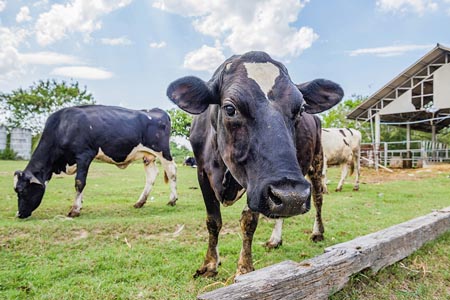Moove to Greater Health

By Andrew Naia
I unwillingly gave up cow’s milk in middle school. After years’ worth of stomach cramps that resulted in a loss of appetite, it was time for a change. I remember looking around at the other kids drinking from their chocolate milk cartons with envy. Why me and not them? Many years later I took an allergy test that told me I was indeed not lactose intolerant. This was surprising as my reaction to milk was an obvious malady. But for some reason, on paper, I was completely normal.
So I started doing my own research; what could be causing my body to have this reaction? It was blatant that dairy made me uncomfortable, but why was it okay for so many others? It turns out that 75% the world’s population is lactose intolerant. That is a rather large number of people who have difficulties digesting lactose enzymes–I am not alone. Many people have accepted the side effects as normal; not realizing their bodies are becoming stressed from a strange encounter.
It makes you think. Why would a full-grown human being need the milk from a cow? A calf’s diet is certainly strange to incorporate in my own. The reason babies need their mother’s milk is for rapid weight gain and to receive nutrients they do not already have. Calves are able to put on weight incredibly quickly. The same goes when we were babes…how quickly does a child grow out of an outfit? Feels like every other day.
But milk has calcium, and our bones need that. Well, it turns out there is no evidence that dairy helps prevent osteoporosis or is even good for your bones. Moreover, the majority of humans naturally stop producing significant amounts of lactase before five years of age. Most mammals stop producing the enzymes needed to properly digest milk after they have been weaned.
Nature did not intend us to carry on nursing. Our stomachs are not designed to digest milk on a regular basis. Most scientists agree that it is best to consume calcium, potassium, protein, and fats from other food sources such as vegetables, fruits, beans, whole grains, nuts, and seeds. (When in doubt, choose vegetables for your nutrient intake.)
Furthermore, other studies revealed that the calcium from milk does not even affect bones. Vitamin D is much more effective for preventing osteoporosis. A study showed that countries with the higher amount of dairy in their diet have higher rates of osteoporosis than countries with significantly less intake. An estimated 1 out of every 4 American men are expected to encounter osteoporosis in their lives, and women are even more likely to develop it. Which is an alarming number–we are talking around 44 million people. For a person to have osteoporosis, he has lost 50-75% of the original bone material from his skeleton. Osteoporosis is, in fact, a disease caused by excess dietary animal protein.
So, what can we do about this? The best way to make sure we do not develop osteoporosis (and other weight related ailments) is through prevention. Milk products are a staple in American culture. From hot chocolate, to baked Brie, to ice cream sandwiches…they are all delicious. But try this for two weeks: cut out all dairy. No cow’s, sheep’s or goat’s milk. No cheese, yogurt, ice cream, coffee creamer, etc. Switch to almond, cashew, or coconut milk and see how you feel. These milks are much lighter than cow’s, meaning you should actually lose weight. Your digestion will improve and you will be less gassy and bloated. You also do not have to worry about the nut or coconut milks being pasteurized or raw with hormones, pus, antibiotics, etc.
It is not the same great taste of cow’s milk, I know. It takes time to adjust to love these vegan milks. But you might just surprise yourself with how much better you feel after kicking the dairy. You are not a calf after all!
If you are worried about what your breakfast will become, try this recipe for homemade, udderly delicious, dairy-free yogurt. You need two ingredients: full-fat coconut milk and probiotic capsules (50 billion bacteria count). Your brain needs fat to function, so always go with full-fat milks. Try to find a coconut milk with zero added sugar.
Empty the coconut milk into a clean glass jar or container. Break open two probiotic capsules into the milk and stir with a wooden spoon. Cover with a cheesecloth and a rubber band for two days. Place in a warm place such as an oven or by a stove. After the two days, place it in the fridge to thicken more.
This yogurt will be more tart than you are used to. For a sweeter version, add honey, maple syrup, or peanut butter. Adding chia seeds will also thicken the yogurt if it is too runny. The milk brand plays a role in the creaminess of the yogurt, so experiment with which works best for you.
This recipe takes time, but is much better for your health than a store brand yogurt that contains 16 grams of sugar. You will not consume any animal proteins that are not meant for you, and you will save one cow from a hard day’s milk.
